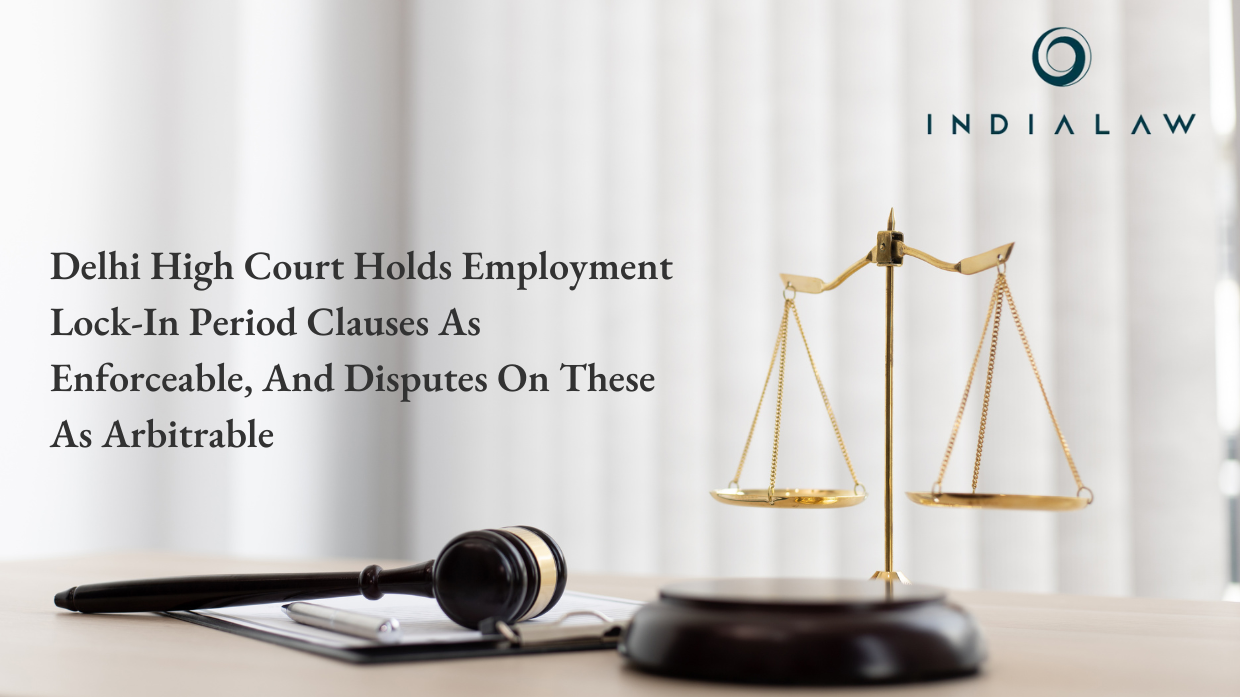Delhi High Court Holds Employment Lock-In Period Clauses As Enforceable, And Disputes On These As Arbitrable

The Hon’ble Delhi High Court (“HC”) recently ruled that a reasonable lock-in period in an employment contract is lawful and thereby, does not infringe upon fundamental rights. The HC clarified that disputes arising from such lock-in periods are arbitrable. While clauses prohibiting employees from pursuing employment in competing businesses after contract expiration are unenforceable, those prescribing rules of confidentiality, data and intellectual property right protection, for an employee during his employment are valid.
Table of Contents
Brief Facts:
The HC was hearing tagged petitions filed under Section 11(6) of the Arbitration and Conciliation Act, 1996[i] (“said Petitions”). The said Petitions were filed seeking redressal of disputes under Service Employment Agreements (“said Agreements”) executed between the Company i.e. the Petitioner and employees i.e. the Respondents, via arbitration.
The said Agreements stipulated a mandatory three-year commitment during which the Respondent employees agreed to devote their complete time and efforts to the Petitioner Company. However, on 14th June 2023, one of the Respondent employees took leave and did not resume her duties thereafter; thus, completing only one year and two months instead of the agreed-upon lock-in period of three years. The Petitioner Company raised concerns regarding possible violations of confidentiality, intellectual property, and data protection provisions due to the abrupt end to the employment. Similar events occurred in other
Following these occurrences, the Petitioner Company issued a notice on 21st June 2023, initiating arbitration proceedings under the applicable law. In her response dated 18th July 2023, the Respondent employee contested the accusations and declined to participate in arbitration, citing claims of harassment and humiliation. As a result, the Petitioner Company pursued the appointment of an Arbitral Tribunal.
Issues:
The HC focused on disputes arising from Clause 5 of the said Agreement, which imposed a three-year lock-in period barring premature departure from the Petitioner Company. The Petitioner Company initiated arbitration under Section 21 of the 1996 Act[ii], as specified in Clause 17 of the said Agreement, however, the Respondent employee declined arbitration. The core contention was that these disputes were non-arbitrable, arguing that Clause 5 contravened Article 19 of the Indian Constitution[iii] and Section 27 of the Indian Contract Act, 1872[iv].
Ruling by the Hon’ble Delhi High Court:
The HC upheld the validity of a lock-in period in employment contracts in India, reasoning that such provisions signify an agreement where an employee commits to serve an employer for a specified duration. These terms, including the lock-in period, pay arrangements, and benefits, are typically subjects of negotiation and are voluntarily agreed upon by the parties.
The HC observed that such clauses are essential for the stability and sustainability of the employer organization, particularly at executive levels. The HC reaffirmed established principles regarding the validity of clauses in employment contracts. It stated that any reasonable covenant that operates during the term of an employment agreement is valid and lawful.
Therefore, it was concluded that there is no infringement of any fundamental fight guaranteed by the Constitution of India in the present cases. The HC further clarified that disputes arising from employment contracts typically concern contractual issues rather than violations of fundamental rights. While some employment conditions could unreasonably restrict an employee’s right to work, a three-year lock-in period was not deemed to be such a condition.
Additionally, the HC noted the employer’s concerns regarding the protection of confidential information and its intention to pursue damages from the employees. Since these issues fell within the scope of the respective employment agreements between the parties, the HC determined that the disputes raised were clearly suitable for arbitration under the Arbitration Act. Consequently, an arbitrator was appointed to resolve the disputes between the employer and the employees.
Authors’ Opinion:
The HC ruling clarifies the legality of lock-in periods in employment contracts, affirming that these clauses, which restrict an employee’s ability to leave a company for a specified duration after joining, do not violate fundamental rights under the Indian Constitution. This decision provides employers with stability and safeguards against the expenses associated with high turnover rates, particularly for positions requiring significant training investments. It benefits both employers and employees by fostering business stability while ensuring transparency and consent in contractual agreements.
The judgment grants employers an opportunity in structuring employment terms, allowing them to include reasonable lock-in periods to secure commitment from new hires, especially in critical roles. However, employers must ensure clarity and fairness in communicating these terms during the hiring process. For employees, the ruling underscores the importance of thorough review and understanding of employment contracts before acceptance.
Furthermore, the court’s decision establishes that disputes arising from lock-in clauses can be resolved through arbitration under the Arbitration Act. This facilitates a quicker and potentially more cost-effective resolution process compared to litigation in courts, emphasizing the efficiency of private arbitration for addressing disagreements over the validity and application of such contractual provisions.
[i] Section 11(6) Appointment of arbitrators- (6) Where, under an appointment procedure agreed upon by the parties,—
(a) a party fails to act as required under that procedure; or
(b) the parties, or the two appointed arbitrators, fail to reach an agreement expected of them under that procedure; or
(c) a person, including an institution, fails to perform any function entrusted to him or it under that procedure,
a party may request 1[the Supreme Court or, as the case may be, the High Court or any person or institution designated by such Court] to take the necessary measure, unless the agreement on the appointment procedure provides other means for securing the appointment.
[ii] Section 21 Commencement of arbitral proceedings – Unless otherwise agreed by the parties, the arbitral proceedings in respect of a particular dispute commence on the date on which a request for that dispute to be referred to arbitration is received by the respondent.
[iii] Article 19 (1) (g) All citizens shall have the right to practise any profession, or to carry on any occupation, trade or business.
[iv] Section 27 Agreement in restraint of trade, void – Every agreement by which any one is restrained from exercising a lawful profession, trade or business of any kind, is to that extent void.
Exception 1. Saving of agreement not to carry on business of which good-will is sold. One who sells the good-will of a business may agree with the buyer to refrain from carrying on a similar business, within specified local limits, so long as the buyer, or any person deriving title to the good-will from him, carries on a like business therein, provided that such limits appear to the Court reasonable, regard being had to the nature of the business.
By entering the email address you agree to our Privacy Policy.



